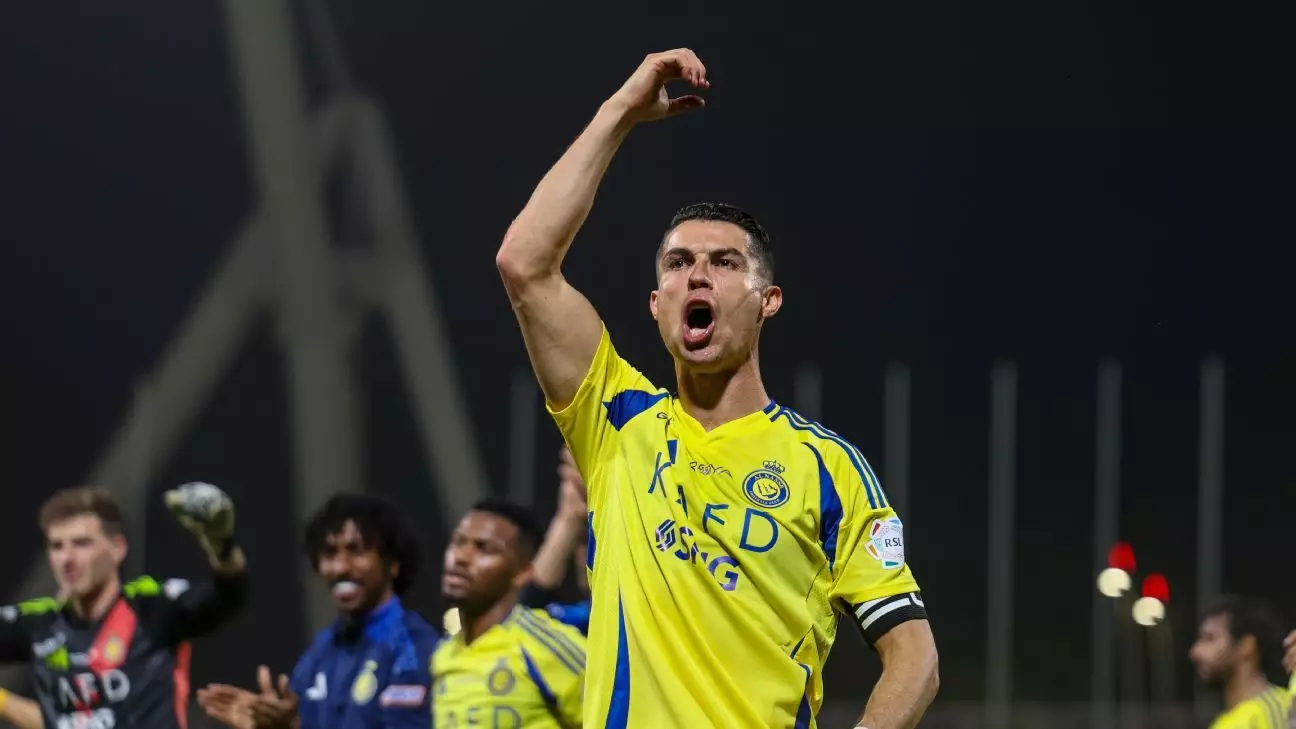In a shocking yet fascinating turn of events, Al Nassr has reportedly extended a two-year contract offer to none other than Cristiano Ronaldo, who at 40 remains a powerhouse on the field. With an astonishing 30 goals in just 34 appearances this season, Ronaldo has defied his age and continues to play at an elite level. This is not merely a mere attempt to retain a fading star but rather a strategic move to keep a significant draw card in the fiercely competitive football world. Ronaldo’s earlier commitment to Al Nassr, stating that he intends to conclude his career there, hints at a distinct loyalty to the Saudi Pro League, contesting the misconceptions surrounding players who switch leagues primarily for financial incentives.
Ronaldo’s unique ability to remain relevant in a sport that often discards older players is something worth noting. Despite the whispers that he may retire “soon,” his sustained performance raises questions about what true longevity in sports entails. As he inches toward what many assume is the twilight of his illustrious career, this contract extension could signal the dawn of a new era for Al Nassr, which aims to establish itself as more than just a transient destination for aging superstars.
The Barcelona Complication: Luis Díaz in the Spotlight
On the flip side, the escalating significance of the Saudi Pro League is striking fear into football’s traditional powerhouses, notably Barcelona, who have set their sights on Liverpool’s rising star, Luis Díaz. As reported, the Catalan giants are feeling the heat from potentially lucrative offers from Saudi clubs that may obliterate their efforts to secure the Colombian winger. With the financial backing of the Saudi Pro League becoming ever-increasingly daunting, this situation pulls the curtain back on a rather volatile landscape of player acquisitions driven by economic surplus rather than sporting merit.
Díaz, who has showcased immense potential since joining Liverpool, could be the latest casualty of financial prowess overpowering sporting ambition. Barcelona’s repeated attempts to entice him away illustrate a burgeoning problem in modern football, where traditional clubs struggle against newer, financially potent contenders. It challenges us to ponder: Are we witnessing the beginning of a power shift in football?
Competition Intensifies for Talented Young Stars
Further downgrading the old guard and affirming the urgency of fresh talent, clubs like Napoli and Chelsea are actively scouting younger prospects. Manchester United’s Alejandro Garnacho, a player whose stock has risen within the Premier League, is reportedly on Napoli’s shopping list as they seek essential reinforcements. The situation intensifies when you look at Chelsea’s keen interest in Ipswich’s Liam Delap, currently under scrutiny as one of the Championship’s most promising strikers.
These moves underline a crucial aspect of modern football—investing in future talent rather than focusing solely on established names. The trend not only reflects evolving club strategies but also coincides with shifting fan expectations, where supporters increasingly demand ownership and management prioritization of developmental pathways. An organization’s ability to recognize and nurture young talent may determine its next decade of prosperity.
Players Attracting Global Attention
The carousel of potential transfer opportunities extends beyond any single club, as rising stars, including Chelsea’s Vangelis Pavlidis and Liverpool’s reported pursuit of Nicolò Barella, are making headlines. The intense scrutiny over such players signals a broader trend where financial spend becomes the cornerstone of club strategies rather than loyalty or legacy. Making such significant investments in players—like Barella, who could command over €100 million—not only sets a new benchmark in transfers but might also redefine how teams value player potential in an increasingly competitive marketplace.
Liverpool’s interest in Feyenoord’s Igor Paixao also illustrates an important double-edged sword: clubs that thrive today may be forced to sacrifice their foundational talent for new acquisitions.
The Changing Face of Football Contracts
As this transfer window navigates its complexities, the anticipation and anxiety surrounding contract renewals are palpable across league boundaries. Arsenal’s plans to extend contracts for rising talents display foresight into how essential keeping young, homegrown players is amid rampant external interest. It is a juxtaposition of ideals: holding on to talent while being simultaneously pushed to invest heavily in short-term gains from the global market.
As we forge into a new chapter in global football, where agreements and acquisitions are increasingly dictated by sheer financial might, it prompts an urgent re-evaluation of what makes clubs truly competitive. Do they nurture homegrown talent, or do they aggressively chase already proven stars? The dual narrative facing football in this era promises excitement, challenges, and an uncertain yet thrilling future. The evolution of football contracts and the interplay between old clubs and new money will certainly color the landscape for seasons to come. It is essential to watch, for the effects ripple through not just player dynamics but also fan engagement and investment in the sport itself.

